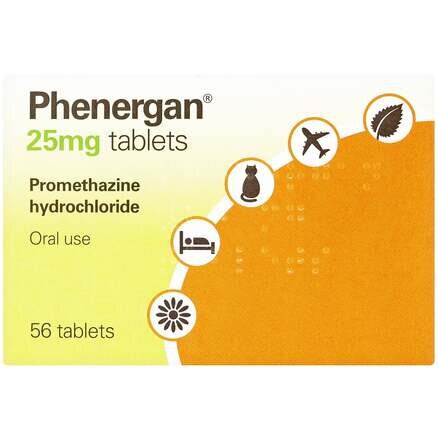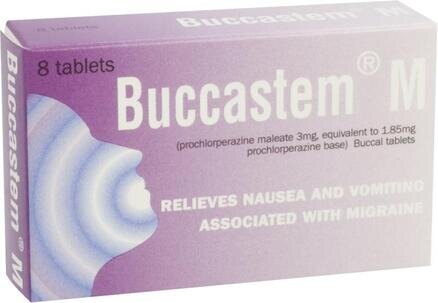Refine your search
Current Selection
Categories
Brands
Availability
Nausea & Sickness
Phenergan 10mg - 56 Tablets Out of stock
From £6.39Phenergan 25mg - 56 Tablets Out of stock
From £7.99Buccastem M - 8 Tablets In stock
£6.89 (Save 12%)Was £7.89
Overview
Feeling that unsettling sensation in your stomach? Whether it's due to a migraine, an inner ear infection, stomach flu, travel, or morning sickness, nausea is something you want relief from – fast. At Pharmacy Online, we have medicine that can help reduce sickness and calm upset stomachs.
We're stocked with over-the-counter and prescription anti-nausea tablets, starting from £6.39, that you can buy online and have delivered to your door with next day delivery.
Ready to find your remedy? Browse our anti sickness treatment range below and start your online consultation today.
What is nausea and sickness?
Nausea is more than just an unpleasant feeling; it's often a sign that your body is trying to tell you something. It can be a symptom of various conditions, from infections and migraines to motion sickness and early stages of pregnancy.
Understanding the root cause is crucial because timely treatment can significantly ease your discomfort and prevent further complications.
How our online pharmacy service works?
Here's how it works:
- Consultation: Start with an online consultation. Simply fill out our quick and easy assessment.
- Ordering: Once you've completed your online assessment, you'll be invited to select your treatment. If you've chosen an over-the-counter option you can buy your anti sickness medicine straightaway. If you've opted for a prescription medicine, one of our pharmacists will review your assessment within 1 hour, and if they successfully prescribe anti sickness medicine, you'll be notified, via email, that your order is due for dispatch.
- Delivery: Choose from our delivery options and get your treatment delivered promptly, right to your doorstep.
Understanding nausea and sickness
Navigating the waves of nausea and sickness isn't just about finding a quick fix; it's about understanding what your body is trying to communicate. Let's dive a bit deeper into what could be causing your nausea and how you can manage it effectively.
What causes nausea and vomiting?
Nausea and vomiting are your body's way of dealing with a variety of disturbances. These can range from simple motion sickness to more complex issues like infections or medication reactions. Here's a closer look at some common triggers:
- Motion sickness: Occurs when the inner ear, the eyes, and other areas of the body that detect motion send conflicting messages to the brain.
- Pregnancy: Often due to the increase in certain hormones in the early stages, commonly referred to as morning sickness.
- Migraines: These intense headaches can activate the part of the brain that controls nausea and vomiting.
- Medications: Some drugs can irritate the stomach or affect the brain's vomiting centre.
- Gastrointestinal disorders: Conditions like Gastroesophageal reflux disease, gastroenteritis or food poisoning can irritate the stomach lining and trigger nausea.
- Psychological factors: Anxiety and stress can also play a significant role in causing nausea.
- Cyclic vomiting syndrome: A rare condition that causes repeated episodes of being sick.
The key here is to pinpoint what's causing your nausea. Once you know the trigger, you're better positioned to find the most effective relief you need.
Nausea symptoms
Nausea isn't just feeling like you might need to vomit. You might also notice stomach discomfort - an uneasy feeling in the stomach that might feel like bloating or indigestion, a dizzy spell, or a general queasiness that makes you want to lie down.
These symptoms are your body's way of sounding the alarm. Pay attention to them. If they persist or worsen, or are accompanied by severe headache, abdominal pain, or fever, it's important to seek medical advice as they could indicate a more serious condition.
How is nausea diagnosed?
Diagnosing nausea isn't always straightforward, as nausea is often a symptom rather than a condition itself.
If you visit your GP or healthcare provider, they'll ask you about your symptoms. They'll want to know when the nausea started, how often it happens, and if anything specific seems to trigger it. It's a good idea to mention any other symptoms you've been experiencing, even if they seem unrelated.
Next, they'll likely ask about your medical history, any medications you're currently taking, and possibly your dietary habits. This conversation helps them rule out or consider various causes, from the more common (like migraines or early stages of pregnancy) to the less common but more serious.
In some cases, if your nausea is persistent or accompanied by other concerning symptoms, your GP might suggest further tests. These could include blood tests to check for infections or hormonal imbalances, urine tests for pregnancy or kidney function, and sometimes imaging tests like an ultrasound or MRI to look at your internal organs.
How to avoid severe nausea
With a few proactive steps, you can significantly reduce your chances of experiencing nausea, or at least lessen its intensity.
Identify your triggers
This is key. Pay attention to what tends to bring on nausea for you. Is it certain types of food, smells, or even stress? Once you know your triggers, you can take steps to avoid them. For some, spicy or overly rich foods might be the culprit, while for others, it could be the motion of travel.
Eat small, frequent meals rather than large ones
Overloading your stomach can trigger nausea, so choose lighter, more digestible foods spread throughout the day. Incorporating ginger into your diet can also be a game-changer, as it's known for its anti-nausea properties.
Stay hydrated
Sipping water throughout the day is better than gulping down large amounts at once, which can upset your stomach and make your nausea worse. And if plain water is hard to keep down, try adding a slice of lemon or a splash of juice for some flavour.
Manage stress
Easier said than done, but stress is a common trigger for nausea, so finding stress-reduction techniques that work for you can make a big difference. This might be yoga, meditation, or simply taking a few minutes to breathe deeply and relax.
Get plenty of fresh air
Avoid stuffy, overheated environments as much as possible. If you're feeling nauseated, stepping outside for a few breaths of fresh air can provide immediate relief.
Follow medication instructions carefully
If you're taking medication that can cause nausea as a side effect, make sure you're following your doctor's instructions on when and how to take it. Sometimes, taking medication with food or at a specific time of day can reduce nausea.
Remember, while these tips can help prevent severe nausea, once you're experiencing nausea, medication is usually the best way to quell it. You can buy nausea medicine online from our online pharmacy and relieve nausea quickly and easily.








